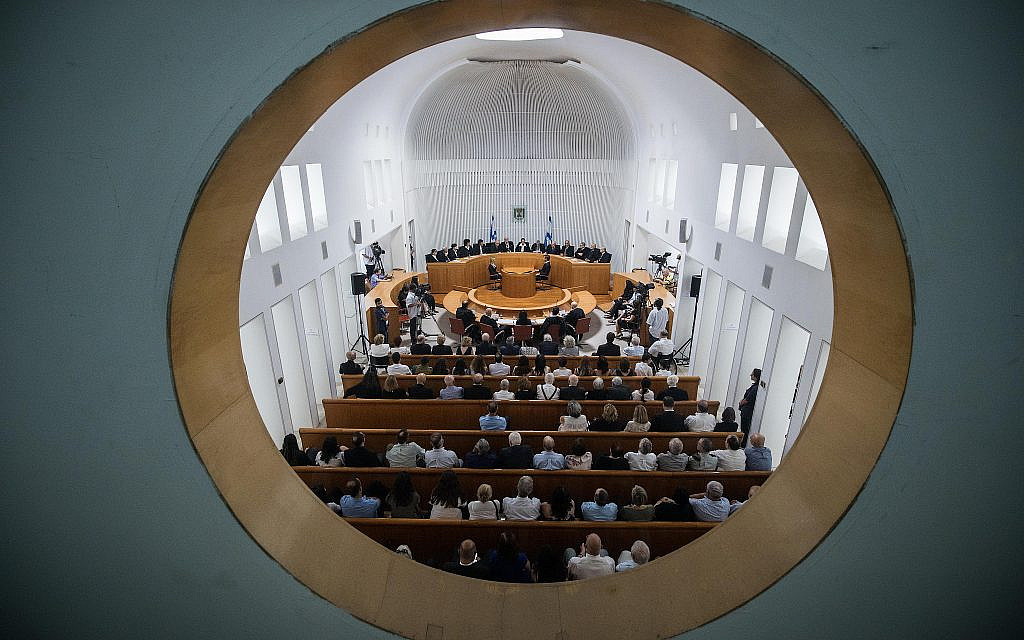This reform will end limitless power for unelected elites
Have a hundred thousand people ever come out to protest against something they think you’re responsible for? Well, I’ve got that going for me.
It’s been widely reported in the Israeli press that the somewhat contentious judicial reforms now being discussed in Israel’s Knesset – and drawing daily rebukes from various professional guilds – are entirely the work of the Kohelet Policy Forum, a staunchly pro-liberty Zionist think tank of which I am founder and chairman.
Kohelet has indeed been researching the issue of Israeli judicial reform for more than a decade and officials have frequently consulted with us and listened carefully to our recommendations, but, as much as my parents would like to believe that I secretly run the country, politicians (sometimes) politely hear me out and then do what they think is right. Ultimately, the credit and the responsibility is theirs.
But of course, we at Kohelet do support the need for serious and urgent judicial reform. In this essay, I’ll explain why, review the current governmental proposals, and consider which points are crucial and which could be modified to achieve better balance.
We seek to promote the freedom of all individuals and all communities, of whatever religion, ethnicity, sexual identity, or other affiliation. The best mechanism for achieving this goal is representative democracy, with appropriate checks and balances among the branches of government.
But what are the appropriate checks and balances among the executive, the legislature and the judiciary? The relationship between the executive and the legislature varies widely across countries with different systems of government. Our concern here is with the checks and balances between the judiciary, on the one hand, and the executive and legislature, on the other.
In many democracies, though certainly not all, the judiciary’s checks on the legislature include the authority to rule on whether a particular statute is inconsistent with principles enumerated in the country’s constitution. Similarly, in most democracies, the judiciary can rule that some administrative action is invalid on certain specified grounds, including violation of rights, discrimination, lack of legal authority and so on. Such checks and balances are in place in recognition of the fact that the legislature and executive are comprised of fallible human beings who might overstep the bounds of legitimate power.
But judges are also fallible human beings no less free from personal or ideological biases and prejudices than legislators. Yet unlike the legislators, they do not need to face elections. What checks exist on the judiciary and what recourse do the citizens have if the Court gets it wrong?
Missing checks
Since we want courts to rule impartially and without fear of reprisal, the checks on the court are typically a bit more subtle than the checks the court holds on other branches. Typically, these are comprised of three elements:
First, justices are chosen by the elected branches. This ensures that across time the ideological composition of the Court roughly reflects that of the voters.
In addition, there are limits on who can petition the court (that is, who has standing) and the kinds of cases the court can hear (what is justiciable). Thus, for example, typically only a person directly affected by some policy can petition the court regarding that policy. Similarly, political questions that are clearly within the jurisdiction of the other branches, such as the selection of government officials, or security and foreign relations, cannot be decided by courts at all, because as the US Supreme Court has said, there are simply no “criteria for a judicial determination.” This ensures that the court is limited to resolving disputes, rather than making policy.
And finally, the court’s tools in considering the legality of an administrative action or the constitutionality of a statute are limited to those defined in law. These tools limit the impact of ideological biases of the Justices, even if they do still leave a wide berth for interpretive “creativity”.
In Israel, none of these checks on the judiciary remain in force.
Sitting Justices and representatives of the Bar Association – who have strong personal incentives to align with the Justices – constitute a majority of the committee that selects new judges. In the case of appointments to the Supreme Court, sitting Justices have an effective veto. This has resulted in a largely ideologically homogeneous court.
As a result of rulings by Justice Aharon Barak in the 1980s, there are no limits on standing or justiciability in the Supreme Court. Anybody can petition the court about anything. This allows the court to insinuate itself in any political issue, even when it can’t point to anybody who has been concretely harmed by the government’s policies on the matter. The Israel Supreme Court specifically says that even the most open-ended policy judgments can be reviewed by courts.
The court has vastly extended the grounds on which it can strike down laws and administrative policies. First, without authorization of the legislature, it declared Israel’s Basic Laws to be its constitution and began striking down laws on that basis. Then it took itself the authority to strike down these Basic Laws themselves – that is, it is prepared to rule on the constitutionality of the Constitution itself. To appreciate how far out of line this is with what Americans are accustomed to, compare this with the US Supreme Court, which has held (Coleman v. Miller) that to even adjudicate questions about the process of constitutional amendment would be an “extravagant assertion” of judicial authority.
In addition, the court has invalidated administrative decisions that met all the criteria of legality, but that the court regards as unreasonable. For example, the court invented a doctrine that lame-duck governments can’t make administrative decisions that bind future governments unless the court says it can. Thus, during any lame-duck government (quite frequent in Israel) the court essentially runs the country.
For example, when then-Prime Minister Benjamin Netanyahu tried to close the PLO headquarters in Jerusalem in 1999, Barak ruled this “unreasonable” because elections were only months away. But when then-Prime Minister Yair Lapid signed away parts of Israel’s sovereign territorial waters to Lebanon five days before the 2022 elections, the court allowed it. It is precisely to avoid this kind of apparent bias that the US Supreme Court has disclaimed jurisdiction of questions that involve mere balancing of policy considerations without specific legal criteria.
The Attorney General’s veto power
In addition to absolving itself from all the standard checks on judiciaries, the court invented out of whole cloth two novel techniques for further extending its own power.
First, Barak decided that the Attorney General is not merely the government’s legal advisor, he is its boss, in the sense that any directive issued by the Attorney General is legally binding on the government. In addition, Barak determined that the Attorney General is the government’s sole representative in court, but is free to argue against the government’s position, thus denying the government any actual representation at all. This effectively gives the judiciary, which empowered the Attorney General, a pre-veto on any government policy, and is entirely inconsistent with the separation of powers.
For example, when the chief prosecutor’s term ended in 2019 during a transitional government, then-Justice Minister Amir Ohana wished to appoint a temporary replacement, as was fully within his authority. The Attorney General, who himself had a significant and well-known conflict of interests, instructed Ohana that it would be unreasonable to appoint anyone other than one particular individual. When Ohana appointed a different candidate, Supreme Court Justice Meni Mazuz issued an injunction against the appointment without citing any grounds at all. The combination of the abuse of unreasonableness as grounds for judicial intervention with the exaggerated empowerment of the Attorney General results in a stranglehold by unelected officials over the policies of elected ones.
A second technique invented by Barak is interpreting laws according to what he calls their “objective purpose.” This is an elegant way of saying that the court should ignore what the law says and read into it what the court believes it should have said. For example, the law specifies that a Supreme Court ruling given by a panel of three judges can be reviewed by a larger panel. Barak wanted a particular decision given by a panel of five judges to be reversed, so he decided that, according to the objective purpose of the limitation to three judges, the number three also means five. (No, I didn’t make this up. Look up the Nachmani case.)
Why then are a significant minority of Israeli citizens convinced that this odd imbalance of power among the branches of government makes perfect sense – and that any changes to bring it in line with other democracies is in fact “the end of democracy”? The key can be found in a commonly used phrase to describe the task of Israel’s judiciary and its proxies in the other branches: the Gatekeepers.
The implication of this term, often spelled out by the less self-aware, is that the majority of Israelis, and in particular their representatives in the elected branches, are insufficiently sophisticated to maintain a republic and run a government. Hence, a powerful cadre of self-selecting elites must watch over them to ensure that they don’t destroy the country. Any attempt to limit the power of these unelected elites or to moderate the methods by which they self-perpetuate is, quite ironically, regarded as a threat to democracy.
Someone who regards elected officials as irredeemable schemers (occasionally true) and judges and legal advisers as entirely unbiased and enlightened (never true) will want to shift as much power as possible from the elected branches to the judiciary. But any serious attempt to determine durable and fair arrangements of power must be done behind some version of what the late political philosopher John Rawls called “the veil of ignorance.” In this case, that means we must assume that we don’t know who among the judges or the members of the coalition share our worldview and political preferences.
It is quite clear that behind such a veil of ignorance, a rational voter would prefer precisely the reforms currently being considered by the Knesset. Specifically, if we did not know a priori the particular biases of the judges and the legal advisers, and how they aligned with our own, we would:
- not abide legal advisers ordering around elected officials
- not wish for judges to substitute their own policy preferences for those of elected officials
- not allow judges to choose their own successors, thereby perpetuating preferences possibly at odds with those of the voters
- not allow judges to place themselves above the Constitution
- require high procedural barriers to an anti-majoritarian act such as striking down legislation
Modifications
These five problems are precisely the ones addressed by the reform currently under consideration in Israel’s Knesset. If we drill down just a bit into the details of how these problems are being addressed, it is not difficult to see where modifications could be considered.
One: The proposal simply states that the government is free to choose its own legal positions and its own line of defense and representation in court. An alternative approach to achieving the same results is to allow the government and ministers to hire and fire their legal advisors at their own discretion. This is not currently the case and is not included in the reforms.
Two: The reforms establish that the court cannot use “unreasonableness” as sole grounds for invalidating an administrative decision; all other grounds remain unaffected. The really egregious cases of judicial abuse of this criterion concern decisions taken by the government itself or by ministers. Thus, most of the problem could be resolved if the court were simply prevented from using claims of unreasonableness to invalidate governmental or ministerial decisions, but were empowered to use such claims regarding other administrative agencies. This has been suggested by a number of informed observers, including Supreme Court Justice Noam Solberg.
Three: The Judicial Selection Committee currently consists of nine members (three sitting justices, two representatives of the Bar Association, two ministers and two MKs – including one from the opposition). The proposed change would replace the two Bar representatives with a Minister and a coalition MK. Perhaps a better approach would be to reduce or eliminate the participation of Justices and to strengthen the representation of opposition MKs.
Four: Clearly, it is absurd for the court to even consider hearing petitions on the constitutionality of the Constitution (namely, the Basic Laws); there is simply no legal basis for such a thing and it effectively gives the court absolute power. It is, of course, also the case that there must be some procedural barriers to the legislature’s power to pass or amend Basic Laws, as will be discussed below.
Five: Finally, the reforms allow the Supreme Court to strike down laws only with a full bench of 15 Justices and a majority of 12. (Note that this would be the first time that the court’s authority to strike down laws at all would be recognized by the law.) In addition, it allows a majority of Knesset members to override such a ruling. Considering the understandable fear that such an override could be abused and the danger that it would contribute to escalating tension between the branches, its exclusion from the reform in exchange for broader support for other more consensual elements would be constructive.
In addition, the reforms do not include the standard judicial requirement that, with a small number of obvious exceptions, plaintiffs be granted standing before the court only if they have been concretely harmed. This should be added.
In short, with relatively minor changes, the proposed reform would easily meet the “veil of ignorance” test.
To be sure, there are two objections to the above argument that are frequently raised by critics of the reform. One is that there are insufficient barriers to legislative power in Israel. There is neither a second house in the legislature nor a presidential veto. And there is no complete Constitution. All this is true and it must be remedied quickly and thoroughly. Indeed, because Kohelet’s highest flag is liberty, we are aware more than anyone that much legislation is short-sighted and likely to result in unintended, and undesirable, consequences.
The solution is not to accept juristocracy, but rather to raise the barriers to legislation. For example, a Basic Law voted on initially by the Knesset should not be finally passed until it has been affirmed in a final reading by the subsequent Knesset.
The second objection raised by critics of judicial reform is that the court, by its very nature, merely extends rights and freedoms, so lovers of liberty ought to support the expansion of the court’s authority. Unfortunately, this claim is empirically false. The lack of constraints on the legal establishment mostly results in it acting to extend its own ideological, institutional, and sometimes personal interests, as the sad tale of Amir Ohana’s attempt to appoint a Chief Prosecutor well illustrates.
Judicial extravagance
Consider this example. Israel’s courts exclude tainted evidence, “the fruit of the poisoned tree”, only at their discretion. In 2021, in what was clearly a fishing expedition, police seized the mobile phones of two of Netanyahu’s closest aides and downloaded their contents on the pretense that the pair had harassed a witness (the witness claimed no knowledge of any such harassment) and without the requisite court order. After they apparently found what they were looking for, the police requested the court order and the Supreme Court ruled that such a retroactive request was valid and could be granted.
In fact, in many cases, the court’s ostensible extensions of rights actually result in restrictions on freedom. For example, a deputy attorney general read into “equality” a prohibition on holding a gender-separated Haredi event in a municipal park. The court affirmed this prohibition in the case of municipal pools in neighborhoods with traditional populations (Bedouin and orthodox Jewish) and, in addition, restricted the right of colleges to offer gender-separated classes to those who sought them. Thus, communities have been prevented by the legal system from voluntarily living according to their religious beliefs and preferences in the name of vague principle. And it is worth bearing in mind that a future court might use precisely these principles to prevent a women’s parade or any sort of voluntarily segregated event.
In another example, a Supreme Court Justice wrote an opinion that the government did not have the authority to stop funding a public broadcasting station because this would somehow violate freedom of speech. The result of this kind of overreach is that, as I have personally witnessed on multiple occasions, legislators are afraid to enshrine rights and freedoms in law for fear of what absurdities a judge might find in them. Thus, an unintended effect of judicial extravagance is legislative stinginess.
In short, those who are understandably concerned about the threat to liberty from elected officials who are responsible to the voters should be no less concerned about the dangers of a small, self-perpetuating judicial elite that disrespects the voters. It is this danger that the current reform seeks to address.
If opponents of the reform would negotiate on its merits, instead of equating their own loss of political power with “the end of democracy,” perfectly reasonable arrangements supported by a broad consensus are within easy reach. Any takers?









